What a second Trump term could mean for construction
26 July 2024
Amid an unprecedented campaign for the US presidency, the polls are currently favouring Republican nominee Donald Trump. Having just secured the endorsement of major US-based trade organisation Associated Builders and Contractors (ABC), what would a Trump victory mean for construction?
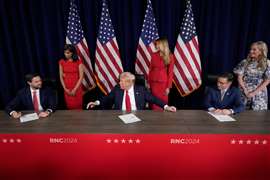 Donald Trump, center, JD Vance, left, and US Speaker of the House Mike Johnson sign official nomination documents along with their wives, from left, Usha Chilukuri Vance, Melania Trump and Kelly Johnson, during the final day of the Republican National Convention in Milwaukee, Wisconsin, US. (Image: Reuters/Mike De Sisti/Milwaukee Journal Sentinel/USA Today Network)
Donald Trump, center, JD Vance, left, and US Speaker of the House Mike Johnson sign official nomination documents along with their wives, from left, Usha Chilukuri Vance, Melania Trump and Kelly Johnson, during the final day of the Republican National Convention in Milwaukee, Wisconsin, US. (Image: Reuters/Mike De Sisti/Milwaukee Journal Sentinel/USA Today Network)
The national campaign for the US presidency has already been one for the history books.
Notable events so far have included the attempted assassination of Republican candidate and former President Donald Trump and incumbent Democratic President Joe Biden dropping out of the race.
With more than three months left to run (the election is held on Tuesday, November 5), the chaos and confusion entailed in an intensifying campaign are likely to deepen insecurity in the construction industry.
At present, Trump is leading presumptive Democratic nominee and current US vice president Kamala Harris. With a four-year blueprint available from Trump’s term, more of the same is expected if he wins a second, but how will it differ from the Biden/Harris administration?
1) On trade policy and materials importing, little should change
A major initiative of the Trump presidency was implementing an ‘America First’ economic policy, which included shifting the country away from multilateral free-trade agreements and toward bilateral trade deals (the exchange of goods between two nations).
As part of this policy, Trump’s administration imposed sweeping tariffs on imported goods, particularly from China, including materials vital to the construction industry: solar panels, steel, and aluminium. While nearly every country importing goods to the US was handed the tariffs, the most tariffs and the highest rates were levied on Chinese imports.
Party leadership made clear they still see an ‘imbalance’ between US imports and exports.
Republican Congressman of Wisconsin, Bryan Steil – at a policy panel held at a Komatsu facility in Milwaukee during the Republican National Convention – said, “We’ve had trade agreements that have been done not to the benefit of American workers in the past sometimes. And what we need to do is make sure that it’s free, fair, and reciprocal.”
Steil added, especially for manufacturers, encouraging exports of innovative products made in the US is the ultimate goal of the party’s trade policy.
“That US companies have access to foreign markets is a key piece of that, [and] I think that’s something that President Trump has been a great leader on.”
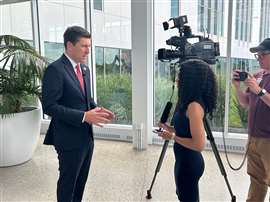 US Congressman Bryan Steil of Wisconsin at a Komatsu facility in Milwaukee. (Image: Mitchell Keller)
US Congressman Bryan Steil of Wisconsin at a Komatsu facility in Milwaukee. (Image: Mitchell Keller)
Free-trade proponents criticised Trump during his term and have continued to argue that Biden’s support of tariffs on imported Chinese materials is anti-competitive and hampering growth.
Michelle Ritchie, industrial products deals leader with global consultancy PwC, told Construction Briefing more tariffs could fuel already high inflation figures.
“We’ve been dealing with inflation, and if the tariffs start changing, it’s just going be the same thing, and we don’t see it as top of mind because it gets wrapped in the inflation,” explained Ritchie. “It is such a global economy from that perspective.”
As a result of the recent tariff fallout, Ritchie says she expects firms to keep investing in core services and products but to trim down elsewhere. “Particularly some of the largest contractors and even some of the larger home builders are talking about divestment, and it’s sometimes massive amounts,” she said.
While economic analysis of Trump’s tariff policy is mixed, there was (seemingly) a surprise proponent of it: Joe Biden.
Biden eased much of the Trump-era tariffs, particularly for governments of US allies, but he recommitted to imposing the charges on Chinese goods back in May. Biden not only kept alive the more than US$300-billion-worth of tariffs his predecessor implemented but added another $18 billion to a new list of Chinese goods incurring tariffs, including electric vehicles, batteries, semiconductors, solar cells, and ship-to-shore cranes.
While it is hard to project exactly what another round of a Trump-China trade war would look like, a Trump presidency is not expected to be too radically different in this respect than the current Biden administration, at least in the short-term.
2) Trump could expand on tax cuts
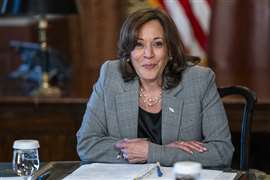 US Vice President Kamala Harris delivers remarks to consumer protection, labour, and civil rights leaders during a meeting to discuss risks related to artificial intelligence on 12 July, 2023. (Image: Reuters/Shawn Thew/Pool/abacapress.com)
US Vice President Kamala Harris delivers remarks to consumer protection, labour, and civil rights leaders during a meeting to discuss risks related to artificial intelligence on 12 July, 2023. (Image: Reuters/Shawn Thew/Pool/abacapress.com)
One of the most substantial pieces of legislation passed by the Trump administration was the Tax Cuts and Jobs Act (TCJA), which became law in 2018.
The legislation amended the US’ Internal Revenue Code of 1986.
The major implication for the construction industry came from a novel flat tax rate (21%) compared to a tiered tax rate that ranged from 15% to 39% depending on the amount of a firm’s taxable income.
Portions of the tax law also favoured companies with overseas operations. The law changed the US from a global to a territorial tax system in which each subsidiary of a company pays the tax rate of the country in which it is legally established (saving the difference between the US’ generally higher tax rate and the lower tax rate where the company is established).
Portions of the tax law are set to expire for individuals in 2025, however, the corporate tax cuts are permanent until (if ever) amendment by law.
Republican Governor of Virginia Glenn Youngkin said the party was eager to renew the TCJA. “We cannot let the Trump-Ryan tax cuts lapse,” said the governor, referring to then US Speaker of the House Paul Ryan, who championed the bill, which is now law.
Trump, if elected, would likely replace the expiring law with a new one (as it relates to individuals) or take steps to extend the existing law. Moreover, it’s possible a future President Trump could also entertain additional tax rate changes for corporations, though nothing has been signalled at this point in his campaign.
Ritchie said the uncertainty surrounding corporation taxes can create a freeze in business actions among some while inspiring a flurry of mergers and acquisitions (MA) before the election.
“They’re uncertain what’s going to change,” Ritchie said. “You have a huge push for M&A to get it done, because you know what today’s market looks like.”
3) Deregulation – especially of environmental protections – will return
There’s arguably no talking point as big to Republicans as deregulation.
Ritchie at PwC said it was her sense that future changes to the tax code and industry deregulation were the “two biggest levers” of the upcoming election, but the latter was perhaps the most significant.
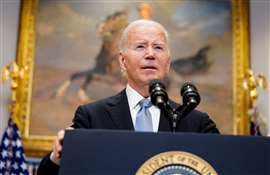 US President Joe Biden delivers a statement on 14 July at the White House a day after Republican challenger Donald Trump was shot at a campaign rally. (Image: Reuters/Nathan Howard)
US President Joe Biden delivers a statement on 14 July at the White House a day after Republican challenger Donald Trump was shot at a campaign rally. (Image: Reuters/Nathan Howard)
During Trump’s first term, deregulation of industry was a top priority, but no segments were as thoroughly relaxed as the energy and climate sectors.
Executive Order 13771 (2017) was one of the bluntest deregulation instruments utilised by Trump; it mandated that any executive department or agency of the government remove two regulations if it wishes to implement a new one. This order was rescinded by Biden on his first day in office, but if Trump were to win this November, the same executive order (or one similar) is nearly certain to resurface.
However, Ritchie cautioned that, even if Trump wins the presidency, a split Congress is less likely to pass extreme deregulation measures.
Additionally, topics like repealing the Davis-Bacon Act (DBA) – a US federal law regulating labour wages – can’t be undone unilaterally by a president. The law passed in 1931 establishes a requirement to pay prevailing wages to labourers on public-works projects.
At present, a legal challenege by the Associated General Contractors of America has suspended a Biden-era ruling on the DBA; in simplest terms, courts ruled that federal contracts must explicitly state DBA provisions and that they cannot be implied to cover all federal contracts. Further, the suspension pauses the need for businesses to pay prevailing wages to off-site material suppliers (including factory workers) and truck drivers.
Project 2025, a policy gameplan written by conservative think-tank The Heritage Foundation, the authors of which are connected with Trump and his former administration, called for a complete overhaul of the DBA. However, the US House of Representatives and US Senate would need to agree to such an action.
While proponents of deregulating might be disappointed that the DBA is unlikely to be immediately and fully repealed, Ritchie noted a lot of contractors may actually find comfort in consistency.
“If the White House and Congress are not the same party, [contractors] feel a lot more comfortable that nothing will change, and then it’s just about business,” she added.
Construction “adept” at adjusting to policy
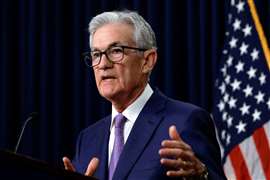 US Federal Reserve Chair Jerome Powell delivers remarks during a press conference on 12 June, 2024. (Image: Reuters/Evelyn Hockstein)
US Federal Reserve Chair Jerome Powell delivers remarks during a press conference on 12 June, 2024. (Image: Reuters/Evelyn Hockstein)
Ultimately, Ritchie said the industry is adept at adjusting to policy and will put its best foot forward regardless of who is in the Oval Office in 2025. But, until that happens, she said contractors are likely to protect and insulate their businesses in the coming months before the election.
“It’s all about, not necessarily where the policies are going, because we can figure out policies and people can react to that, but it’s about uncertainty of the change, and that’s what’s pausing people,” she said.





